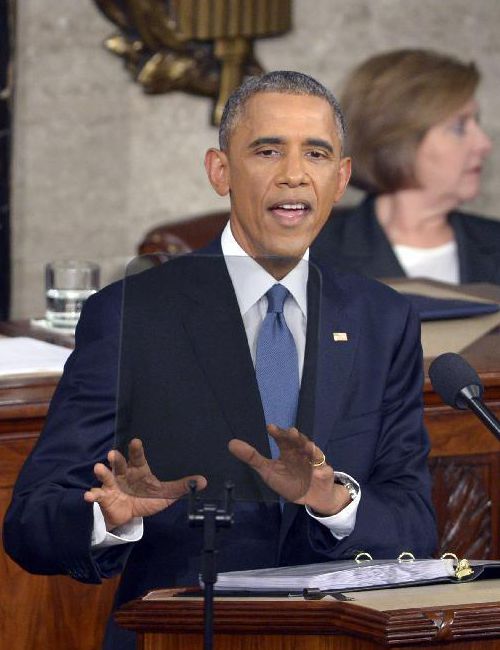

 |
| U.S. President Barack Obama delivers the State of the Union Address to a joint session of Congress on Capitol Hill in Washington D.C., the United States, Jan. 20, 2015. (Xinhua/Yin Bogu) |
US should focus on cooperation, not exclusion: analyst
Analysts on Wednesday hit back at US President Barack Obama's State of the Union speech, saying that China has never sought to be the rule maker, and the statement reflects a US ambition to pursue world domination.
President Barack Obama said on Tuesday the US, not China, must write trade rules for Asia, and called on Congress to give the White House a freer hand to close trade deals as he delivered his annual State of the Union address.
"But as we speak, China wants to write the rules for the world's fastest-growing region. That would put our workers and businesses at a disadvantage. Why would we let that happen? We should write those rules. We should level the playing field," Obama said.
"Obama's address indicates that the US still wants to dominate the world. They worry that China's fast development will challenge the status of the US," Zha Xiaogang, a research fellow at the Shanghai Institute for International Studies, told the Global Times Wednesday.
Rather than becoming the rule maker, China is more interested in developing an economy that aims at creating mutual benefits, Zha said.
Foreign ministry spokeswoman Hua Chunying told a media briefing on Wednesday that China has always followed the win-win principle in economic cooperation with other countries, including the US.
China wishes all parties to work together to create a fair, open and transparent environment for economic cooperation as well as to contribute to the improvement of world trade rules, Hua said.
Obama, who is pushing to overcome resistance to so-called fast-track authority from within his own party as well as conservative Republicans, said that if China prevailed, US workers and businesses would be at a disadvantage.
"That's why I'm asking both parties to give me trade promotion authority to protect American workers, with strong new trade deals from Asia to Europe that aren't just free, but fair," he said.
China is not included in the Trans-Pacific Partnership (TPP) the US is negotiating with 11 other trading partners, which aims to set common standards on issues such as workers' rights and the environment as well as lower trade barriers.
China is pushing for faster progress toward a trade pact with the wider Asia-Pacific Economic Cooperation (APEC) bloc. In recent years, China has proposed or launched a series of multilateral free trade agreement.
The US should pay more attention to developing cooperation with China instead of excluding China in its regional trade pacts, Li Haidong, a professor at the China Foreign Affairs University, told the Global Times Wednesday.
Obama, seeking to complete the TPP and Transatlantic Trade and Investment Partnership pacts, admitted that past trade deals "haven't always lived up to the hype and that's why we've gone after countries that break the rules at our expense."
Ninety-five percent of the world's customers live outside the US, and the US cannot close off from those opportunities, he said, adding that "more than half of manufacturing executives have said they're actively looking at bringing jobs back from China."
Obama also mentioned other Asia-Pacific issues in his address beside trade cooperation.
"In the Asia-Pacific, we are modernizing alliances while making sure that other nations play by the rules - in how they trade, how they resolve maritime disputes, and how they participate in meeting common international challenges like nonproliferation and disaster relief," Obama said.
Zha believes that the statement is a signal that the US intends to be more active in Asia-Pacific affairs.
A climate change agreement reached between the two countries is another highlight in Obama's speech.
"The US will double the pace at which we cut carbon pollution, and China committed, for the first time, to limiting their emissions," Obama said.
China has vowed that its carbon emissions will reach a peak around 2030 with the US planning to slash its "economy-wide" emissions by 26-28 percent below 2005 levels by 2025.
In his address, Obama also called on the US Congress to pass a new authorization of force against the Islamic State militant group and to not rush into new sanctions on Iran over its disputed nuclear program.
He also said the US was upholding "the principle that bigger nations can't bully the small" by opposing what he called Russian aggression and supporting democracy in Ukraine.
His remarks irked Russia as Russian Foreign Minister Sergei Lavrov said on Wednesday that the speech "shows that at the center of the [US] philosophy is one only thing: 'We are number one and everyone else has to recognize that.'"
Agencies contributed to this story
 PLA soldiers operating vehicle-mounted guns in drill
PLA soldiers operating vehicle-mounted guns in drill Beauties dancing on the rings
Beauties dancing on the rings Blind carpenter in E China's Jiangxi
Blind carpenter in E China's Jiangxi Top 10 highest-paid sports teams in the world
Top 10 highest-paid sports teams in the world In photos: China's WZ-10 armed helicopters
In photos: China's WZ-10 armed helicopters UFO spotted in several places in China
UFO spotted in several places in China Certificates of land title of Qing Dynasty and Republic of China
Certificates of land title of Qing Dynasty and Republic of China  Cute young Taoist priest in Beijing
Cute young Taoist priest in Beijing New film brings Doraemon's life story to China in 3D
New film brings Doraemon's life story to China in 3D China-S.Korea FTA sets positive precedent
China-S.Korea FTA sets positive precedent Ferry carrying 458 people sinks in Yangtze River
Ferry carrying 458 people sinks in Yangtze River Mecca of Marxism
Mecca of Marxism Bring them home
Bring them homeDay|Week